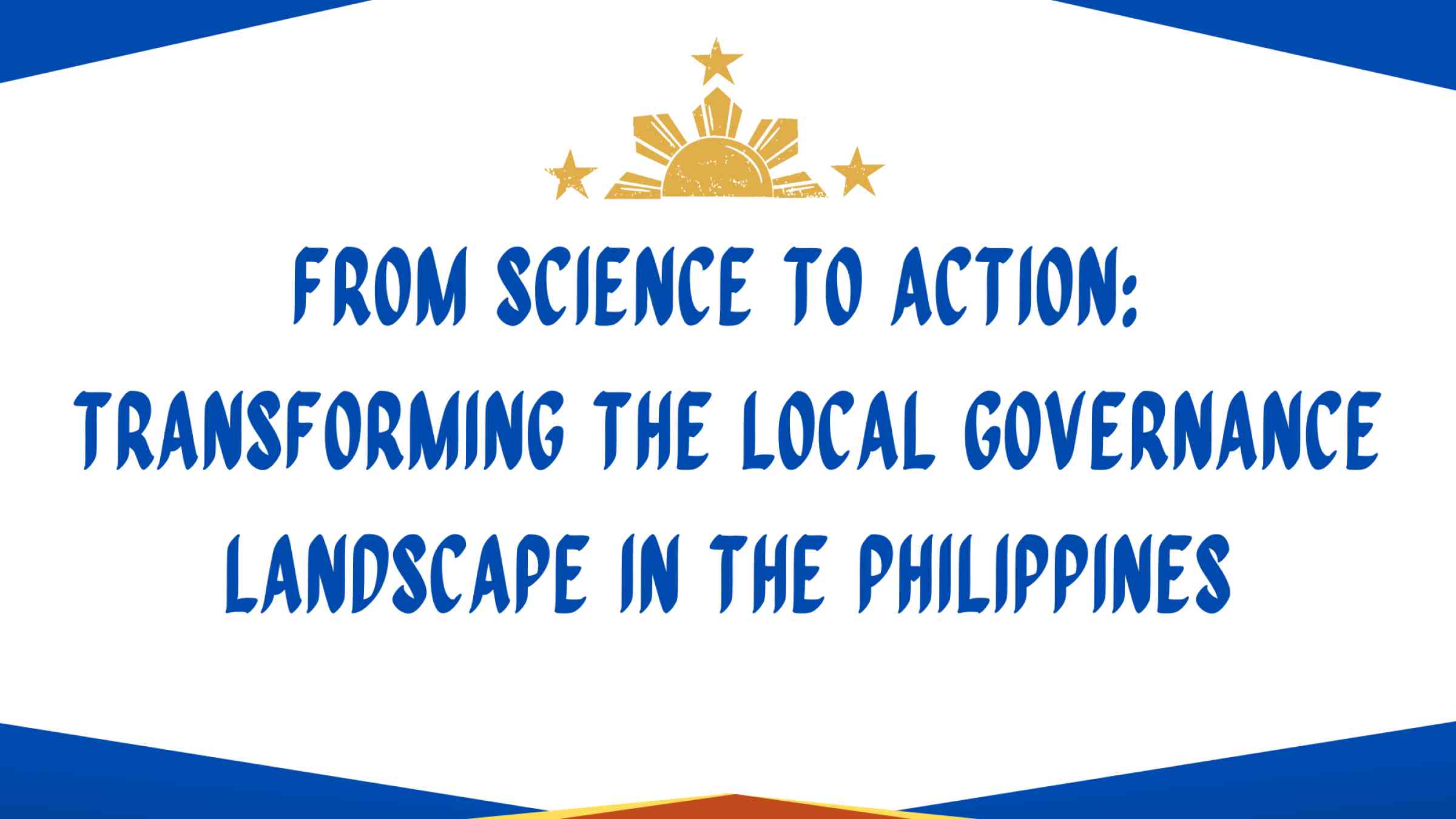From Science to Action: Transforming the Local Governance Landscape in the Philippines
The continuing challenges posed by climate change and disaster risks, highlight the importance of resilient local government unit (LGU) systems that are able to withstand multiple hazards. The interconnectedness of stakeholders in each locality as well as the Philippines as a whole is expected to further heighten the complexities of leading and managing the work of resilience building. In this context, new strategies and mechanisms built upon the foundations of strategic partnerships will be even more critical as the need to transform towards adaptive and inclusive governance and sustainable development can only be achieved through collaborative climate action and disaster risk reduction.
Risks contribute to the vulnerability-poverty cycle and these are linked to the broader national development context. The Philippines has always prioritized disaster risk reduction in addition to preparedness, response, recovery, and climate change adaptation and this is reflected in the Philippine Development Plan 2023-2028 and other national plans and strategies. In recent years, the Philippine Government has emphasized the critical importance of local governance and community-based action that responds to the actual needs of the communities. DRR and CCA plans emphasize the need for DRR to be “gender responsive, sensitive to indigenous knowledge systems, and respectful of human rights” and for the country to have a “gender-sensitive, pro-children, and pro-poor perspective in all climate change and renewable energy efforts, plans, and programs” (Philippine National Disaster Risk Reduction and Management Act of 2010 and Philippine Climate Change Act of 2009).
The partner event aims to highlight how the multistakeholder approach of the Philippines in disaster risk reduction is able to harness science and technology and local and traditional knowledge to inform both policy and practice. One way by which this is done is through Project TRANSFORM (Transdisciplinary Approach for Resilience and Environmental Sustainability through Multistakeholder Engagement). This was developed by the Government of the Philippines-Department of Environment and Natural Resources, National Resilience Council, First Philippine Holdings Corporation, Philippine Business for Social Progress, Peace and Equity Foundation, and Zuellig Family Foundation as an integrated science and technology-enabled comprehensive disaster and climate risk management approach to local governance for collective impact.
The partner event aims to showcase a concrete application of a whole-of-society and evidence-based approach for investments and decision-making, and is an opportunity to link what has already been done by the national and local governments (from provincial to city to municipality to barangay levels) with expertise, opportunities, and networks from the private sector, civil society organizations, people’s organizations, academe, and the local communities themselves. It aims to highlight the importance of sustainability and addressing the root causes of inequalities as it relates to development planning, inclusive resilience building, and economic inclusion.
This event seeks to support the “multi‐hazard management of disaster risk in development at all levels as well as within and across all sectors” (Sendai Framework par. 15).
Speakers
- Ms. Marilou G. Erni, Supervising Undersecretary for Strategic Communications and Chief of Staff, Department of Environment and Natural Resources, Government of the Philippines
- Atty. Jonas R. Leones, Undersecretary for Policy, Planning, and International Affairs, Department of Environment and Natural Resources, Government of the Philippines
- Ms. Agnes de Jesus, Vice President and Chief Sustainability Officer, First Philippine Holdings Corporation
- Dr. Ruby B. Santos-Matibag, President, Bataan Peninsula State University
- Hon. Jose Enrique S. Garcia Ill, Governor, Province of Bataan, Philippines
- Dr. Rajib Shaw, Professor, Keio University, Japan and Co-chair, United Nations Asia Science Technology Academic Advisory Group (ASTAAG) (invited)
- Dr. Wei-Sen Li Executive Director of APEC Emergency Preparedness Capacity Building Center (EPCC) and Secretary General, National Science and Technology Center for Disaster Reduction (NCDR), Taipei (invited)

Agenda
Location
Philippine International Convention Center
Online access
Details
Organized by
Department of Environment and Natural Resources (DENR) Government of the Philippines - National Resilience Council (NRC) First Philippine Holdings Corporation (FPH) Philippine Business for Social Progress (PBSP) Peace and Equity Foundation (PEF) Zuellig Family Foundation (ZFF) Provincial Government of Bataan, Philippines Bataan Peninsula State University United Nations Asia Science Technology Academic Advisory Group APEC Emergency Preparedness Capacity Building CenterContact
Marilou G. Erni, Supervising Undersecretary for Strategic Communications and Chief of Staff, Department of Environment and Natural Resources, Government of the Philippines, email: [email protected]; [email protected].p
